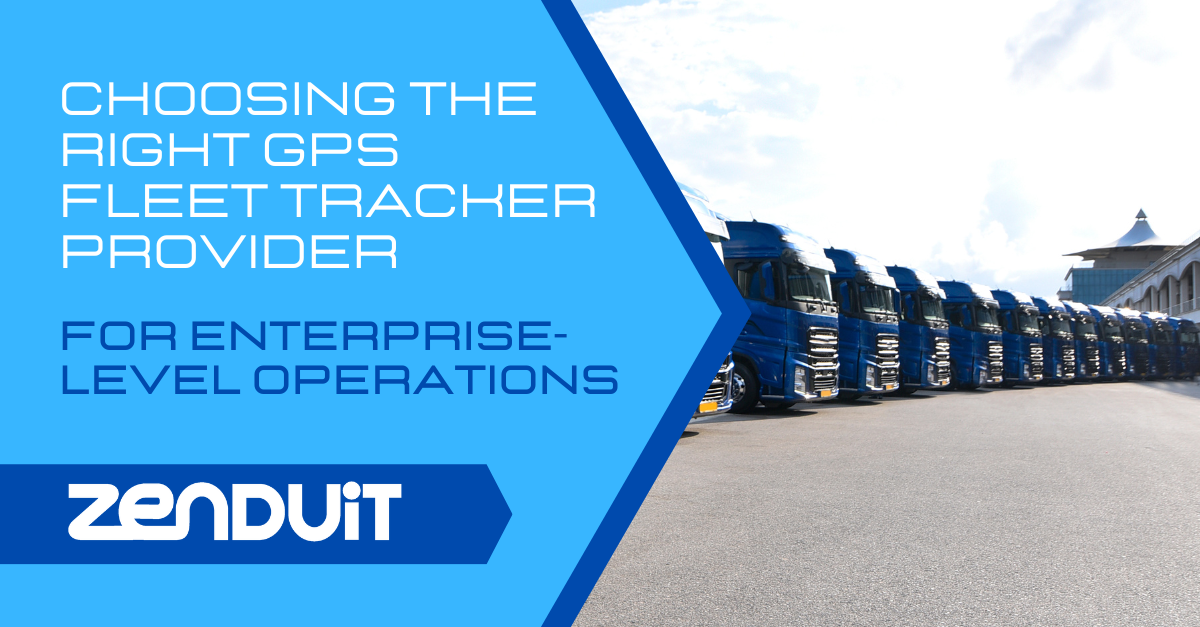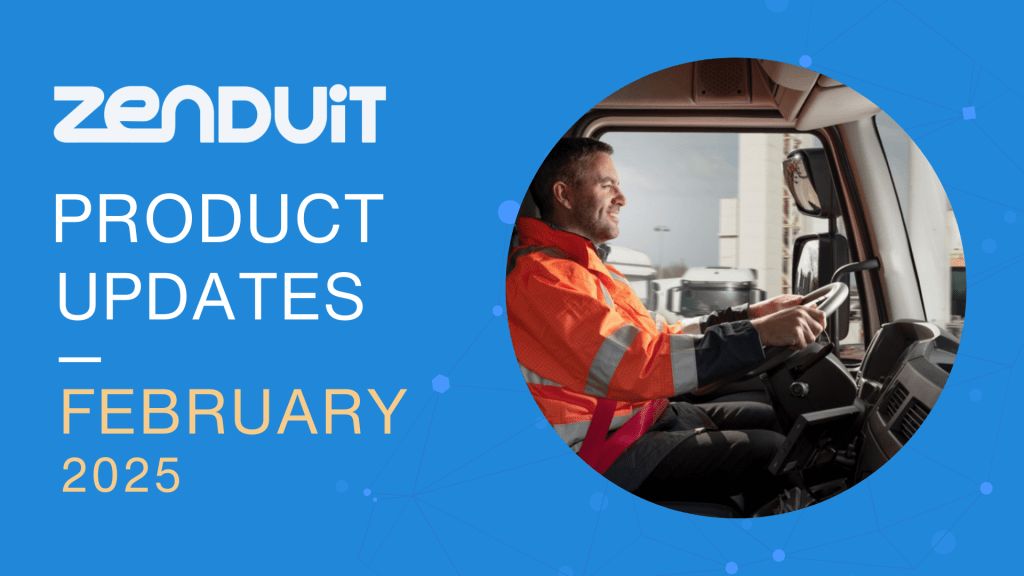Whether you run a logistics company, a delivery service, or any business relying on a fleet of vehicles, real-time visibility and control over your assets are essential. This is where a GPS fleet tracker comes into play, offering a multitude of benefits that can significantly enhance the productivity and profitability of your operations.
In this three-part series, we will delve into the world of GPS fleet trackers, exploring its vital role in enterprise-level operations. More importantly, we will guide you through the crucial process of selecting the right GPS fleet tracker provider, ensuring that you make an informed decision that aligns with your organization’s needs and goals.
The Significance of GPS Fleet Trackers for Enterprise-level Operations
Large-scale business operations often involve multiple departments, locations and customers. When fleets enter the fray, there is also the management of a considerable number of vehicles, ranging from delivery trucks and service vans to an entire fleet of commercial vehicles.
In this dynamic environment, maintaining control over these assets is essential for several reasons:
- Optimizing Efficiency: GPS fleet tracking allows businesses to monitor vehicle movements and optimize routes. This leads to reduced fuel consumption, shorter delivery times, and improved overall efficiency.
- Cost Reduction: By effectively managing routes and vehicle maintenance schedules, companies can significantly reduce operational costs. Lower fuel expenses, reduced wear and tear, and fewer accidents all contribute to cost savings.
- Enhanced Customer Service: Real-time tracking enables companies to provide accurate estimated arrival times to customers. This transparency improves customer satisfaction and fosters trust in your brand.
- Safety and Security: GPS tracking systems enhance the safety of your drivers and vehicles. In case of accidents or emergencies, quick response times are possible with precise location data. Additionally, theft prevention is a significant advantage.
- Compliance and Accountability: Many industries have specific regulations and standards that must be met. GPS fleet tracking helps ensure compliance with rules related to driver hours, environmental regulations, and more. It also holds drivers accountable for their actions on the road.
- Data-Driven Decision Making: Access to a wealth of data, such as vehicle speed, fuel consumption, and driver behavior, empowers businesses to make informed decisions and implement improvements.
Selecting the Right GPS Fleet Tracker Provider
While understanding the significance of GPS fleet tracking is crucial, choosing the right provider is equally important. The market is flooded with various GPS tracking solutions, making it imperative to carefully evaluate your options.
Making an informed choice at this stage is crucial for reaping the full benefits of GPS fleet tracking while avoiding potential pitfalls. In this article, we will delve deeper into these considerations, guiding you through the process of evaluating and selecting the right GPS fleet tracker provider for your enterprise-level operations.
Assessing Enterprise Needs
When it comes to fleet management at the enterprise level, the stakes are higher, the challenges are more complex, and the requirements are unique. Large enterprises, spanning various industries, depend on their fleet operations to maintain the flow of goods and services.
Unique Requirements of Large Enterprises
Large enterprises operate on a different scale compared to smaller businesses, and their fleet management needs reflect this distinction. Here are some key aspects that set enterprise-level fleet management apart:
- Scale and Volume: Enterprise fleets typically comprise a substantial number of vehicles. Managing this scale requires robust systems capable of handling a high volume of data, constant monitoring, and coordination.
- Diverse Vehicle Types: Enterprises often utilize a variety of vehicle types, including trucks, vans, cars, and specialized vehicles. A GPS fleet tracking solution must be versatile enough to accommodate this diversity.
- Geographical Spread: Enterprises may have operations that span across regions, states, or even countries. Effective fleet management necessitates the ability to track and manage vehicles in diverse geographical areas.
- Complex Routes: Large enterprises frequently deal with complex routing and scheduling needs. GPS tracking systems should provide tools for optimizing routes and adapting to changing conditions in real-time.
- Customized Reporting: Enterprises require detailed and customizable reporting to gain insights into fleet performance, identify trends, and make data-driven decisions.
- Integration with Other Systems: Integration with existing enterprise software systems such as Enterprise Resource Planning (ERP) and logistics management software is essential for seamless operations.
- Compliance and Regulations: Compliance with industry-specific regulations, especially in sectors like transportation and logistics, is critical. The tracking system should assist in maintaining compliance and record-keeping.
The Importance of a Fleet Tracker that Addresses Specific Needs
Selecting a GPS fleet tracker provider that understands and can cater to the unique requirements of large enterprises is paramount. Here’s why:
- Scalability: Large enterprises require a solution that can scale effortlessly as their fleet grows. An experienced provider understands the importance of accommodating future growth without disruptions.
- Customization: The ability to tailor the tracking solution to match specific enterprise needs is invaluable. A provider well-versed in customization can help optimize operations effectively.
- Reliability: Large enterprises cannot afford downtime. A provider experienced in serving enterprises will offer robust systems with high uptime and minimal service interruptions.
- Support and Training: Enterprise-level operations often have larger teams managing fleets. The provider should offer comprehensive training and responsive customer support to assist these teams effectively.
- Industry Expertise: Different industries within the enterprise sector have unique challenges and requirements. A provider with experience in your specific industry can offer tailored solutions.
Diversity of Industries and Fleet Sizes
It’s important to recognize that the term “enterprise-level operations” encompasses a wide range of industries and fleet sizes. Enterprises span various sectors, including transportation and logistics, utilities, construction, retail, healthcare, and more. Each of these industries has its own set of priorities and challenges when it comes to fleet management.
Moreover, fleet sizes within enterprises can vary significantly. Some enterprises may have hundreds or even thousands of vehicles, while others may manage smaller but highly specialized fleets.
Understanding this diversity is essential when selecting a GPS fleet tracker provider. The provider should have a track record of serving enterprises across different industries and fleet sizes, showcasing their ability to adapt and cater to a wide range of needs.
In the subsequent sections of this article, we will delve deeper into how specific industry requirements and fleet size considerations play a role in choosing the right GPS fleet tracker provider for your enterprise-level operations. This tailored approach ensures that the provider you select aligns seamlessly with the unique demands of your enterprise.
Core Features and Functionality
When evaluating GPS fleet tracker providers for your enterprise-level operations, it’s crucial to have a clear understanding of the essential features and capabilities that should be on your radar.
These features not only streamline fleet management but also contribute significantly to improved efficiency, safety, and overall operational effectiveness.
Real-Time Tracking
Real-time tracking is the cornerstone of any effective GPS fleet tracking system. It provides continuous and precise information about the location of each vehicle in your fleet. Here’s why real-time tracking is indispensable:
- Enhanced Visibility: Real-time tracking enables you to monitor your fleet’s movements 24/7, ensuring you always know where your assets are located.
- Route Optimization: It allows for immediate route adjustments based on traffic conditions, helping drivers avoid congestion and take more efficient routes.
- Customer Transparency: Accurate real-time tracking enables you to provide customers with precise ETAs, enhancing their experience and trust in your services.
- Security: In case of theft or unauthorized use, real-time tracking facilitates swift action and vehicle recovery.
Historical Data and Reporting
Historical data and reporting features allow you to gain insights into past fleet performance and trends. This capability is vital for making data-driven decisions and continuous improvement:
- Performance Analysis: Historical data helps you evaluate driver behavior, fuel consumption, and vehicle maintenance patterns, identifying areas for improvement.
- Compliance: It assists in maintaining compliance by providing a historical record of driver hours, routes taken, and other relevant data required for regulatory purposes.
- Cost Reduction: In-depth reporting can uncover cost-saving opportunities, such as identifying underutilized assets or vehicles in need of maintenance.
Alerts and Notifications
Alerts and notifications keep you informed about critical events and deviations from established norms. These features are essential for proactive fleet management:
- Geofencing: Alerts triggered when vehicles enter or leave predefined geographical boundaries help monitor vehicle movement and prevent unauthorized use.
- Speeding Alerts: Notifications about drivers exceeding speed limits enable you to address risky behavior and improve safety.
- Maintenance Reminders: Alerts for scheduled maintenance and inspections ensure vehicles stay in optimal condition.
Integration and Compatibility
An effective GPS fleet tracking solution should be capable of seamless integration and compatibility with your existing systems, software, and hardware:
- ERP Integration: Integration with Enterprise Resource Planning (ERP) systems streamlines data flow and ensures consistency in operations.
- Telematics Integration: Integration with telematics systems provides comprehensive vehicle data, enhancing fleet management capabilities.
Mobile Access
Access to the tracking system via mobile devices is essential for fleet managers on the go:
- Remote Monitoring: Mobile access allows you to monitor your fleet from anywhere, providing flexibility and responsiveness.
- Instant Decision-Making: In situations requiring quick decisions, having fleet data at your fingertips via a mobile app is invaluable.
Driver Behavior Monitoring
Driver behavior monitoring features help ensure safe and responsible driving practices:
- Safety: Tracking aggressive driving behaviors, such as harsh braking or rapid acceleration, can reduce accidents and improve safety.
- Fuel Efficiency: Monitoring driver behavior contributes to fuel efficiency by discouraging wasteful driving habits.
Customization
An adaptable and customizable tracking system is essential to meet the unique needs of your enterprise:
- Tailored Reports: Customize reports to focus on the specific metrics and KPIs that matter most to your operations.
- Industry-Specific Solutions: The ability to customize the system to align with industry-specific requirements is crucial.
Geographical Coverage
If your enterprise operates in multiple regions or countries, consider a provider with global coverage. A tracking system with this type of capability ensures you can monitor and manage your fleet, no matter where your vehicles are located.
Scalability and Flexibility
When it comes to GPS fleet tracker solutions for enterprises, scalability and flexibility are not just desirable qualities; they are essential for adapting to the ever-evolving demands of large companies.
The Importance of Scalability
Handling Growth
Large enterprises often experience fluctuations in their fleet sizes due to business expansion, seasonal demands, or specific projects. A scalable GPS fleet tracker solution can seamlessly accommodate these changes without causing disruptions in your operations.
For example, a logistics company that experiences a surge in deliveries during the holiday season can quickly add new vehicles to their fleet tracking system without the need for significant infrastructure changes. Conversely, during periods of reduced demand, they can scale down without incurring unnecessary costs.
Meeting Peak Demands
Certain industries have peak seasons or periods of heightened demand. Scalable systems can handle increased data traffic during these times, ensuring that real-time tracking, reporting, and alerts remain responsive and reliable.
For instance, a retail chain with a large delivery fleet might require additional monitoring and reporting capabilities during major sales events. Scalability allows them to temporarily scale up their tracking system to meet these needs and then revert to normal levels afterward.
Adapting to Acquisitions
Large companies often acquire other businesses, which can lead to a significant increase in fleet size and diversity. Scalable systems can integrate these new assets seamlessly and ensure consistent tracking and reporting across the entire fleet.
The Role of Flexibility
Customization to Specific Needs
Flexibility in fleet tracking solutions allows enterprises to customize the system to their specific needs. Whether it’s tailoring reports to focus on key performance indicators (KPIs) or adding industry-specific features, a flexible system can adapt to unique requirements.
For example, a construction company may need specialized tracking features for heavy equipment, while a healthcare organization might require additional compliance tracking for medical transport vehicles. Flexible systems can accommodate these distinct needs.
Adapting to Technology Trends
The field of fleet tracking is continually evolving, with new technologies and features emerging regularly. A flexible system can easily integrate these innovations, ensuring that your enterprise remains competitive and up-to-date.
Consider the adoption of electric vehicles (EVs) in fleet operations. A flexible tracking system can adapt to the unique characteristics and requirements of EVs, such as monitoring battery health and optimizing charging schedules.
Real-world Benefits for Large Companies
Let’s explore real-world scenarios where scalability and flexibility provide tangible benefits to large enterprises:
- International Expansion: An enterprise expanding into new regions or countries can quickly scale its tracking system to include vehicles in different geographic locations. The flexibility to customize features based on regional regulations and needs ensures compliance and efficiency.
- Seasonal Fluctuations: A delivery service experiencing seasonal spikes in demand can easily scale its tracking system to accommodate additional vehicles during busy periods. Customized reporting helps in analyzing seasonal trends and optimizing resources accordingly.
- Mergers and Acquisitions: When two companies merge, they can seamlessly integrate their fleet tracking systems, regardless of the technologies and features previously in use. Flexibility allows for harmonizing different tracking systems into a unified, efficient solution.
- Industry-specific Requirements: Enterprises operating in sectors with unique requirements, such as healthcare or hazardous materials transportation, can tailor their tracking systems to meet industry-specific regulations and safety standards.
Stay tuned for the next section of choosing the right GPS fleet tracker provider for enterprise-level operations, where we examine integration capabilities, as well as essential support and training so you can get the most out of your fleet tracking solution.








































